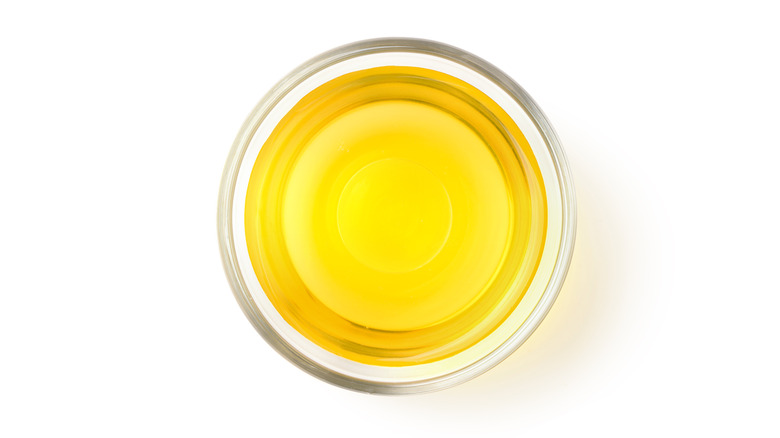Is Canola Oil A Healthy Oil?
Canola oil often provides a hot button point of dispute among health-savvy individuals, including nutritionists. The debate over whether the golden oil is actually good for you, or is slowly harming you with toxic compounds, continues even today. But research conducted in recent years can shed more light on the issue.
HuffPost provides some history on the plant's origins. The canola plant was created by Canadian scientists from the University of Manitoba through cross-breeding in the 1960s. It is a genetically modified offshoot of the rapeseed plant, which was developed to contain much lower levels of the toxic compounds erucic acid and glucosinolate than the parent rapeseed plant. Its name comes from a combination of 'Canada' and 'ola' (a term for oil). So, Canola oil is literally 'Canada oil' (via Healthline). Registered dietitian Isabel Smith explains, "The canola plant was developed from rapeseed in order to use it to produce a food-grade oil with lower erucic acid levels. Erucic acid is a compound present in mustard and rape seeds, which is known to be damaging to our health, specifically our hearts" (via Well + Good).
According to experts at Healthline, canola oil is extracted from the canola plant through a multi-step process that involves first heating and pressing the seeds to extract the first 50 – 60% of oil. The chemical hexane is then used along with heat and a variety of extraction methods to collect the rest of the available oil.
Canola crops are now grown all over the world
Some of the oil will be made into shortening or margarine through the process of hydrogenation (a process where hydrogen molecules are added to the oil to change its chemical makeup, causing it to remain solid at room temperature). Because of the process and the chemicals involved in extraction, canola oil is considered to be a highly-processed, chemically-refined oil (via Healthline).
However, canola oil does have many devout fans who praise its neutral flavor and high smoke point (via Well + Good) as well as its low amount of trans fat and high amount of unsaturated fat (via HuffPost). But studies have produced conflicting health information, and several of the studies touting canola oil's health benefits have been sponsored by the canola industry itself, leading to concern about conflicts of interest (via Healthline). Animal studies have indicated that canola oil can cause oxidative stress on cells as well as memory loss. Research on canola oil's relationship to heart health has also produced mixed results at best.
While using canola oil from time to time is unlikely to cause problems, it's a better option to use an oil with established health benefits like olive or avocado as your main oil in the kitchen.


